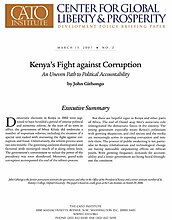Democratic elections in Kenya in 2002 were supposed to have heralded a period of intense political and economic reform. At the start of its term in office, the government of Mwai Kibaki did undertake a number of important reforms, including the creation of a special unit tasked with overseeing the fight against corruption and fraud. Unfortunately, the reform process soon ran into trouble. The governing coalition disintegrated and factional strife reemerged—much of it along ethnic lines. The government’s commitment to reduce the power of the presidency was soon abandoned. Moreover, grand-scale corruption accompanied the end of the reform process.
But there are hopeful signs in Kenya and other parts of Africa. The end of Daniel arap Moi’s autocratic rule reinvigorated the democratic forces in the country. The young generation especially treats Kenya’s politicians with growing skepticism, and civil society and the media are increasingly active in exposing corruption and misrule there. The process of public awakening is not particular to Kenya. Globalization and technological change are having noticeable empowering effects on African youth. With growing frequency, demands for accountability and a better government are being heard throughout the continent.
About the Author

This work is licensed under a Creative Commons Attribution-NonCommercial-ShareAlike 4.0 International License.
